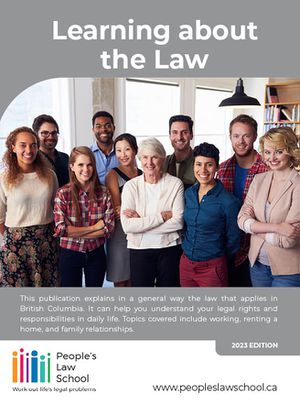About Learning about the Law: Difference between revisions
No edit summary |
|||
| Line 4: | Line 4: | ||
We tried to keep the language easy, but some parts may still be hard. Most words in bold are defined in the section [[What the Words Mean in Learning about the Law|What the Words Mean]]. | We tried to keep the language easy, but some parts may still be hard. Most words in bold are defined in the section [[What the Words Mean in Learning about the Law|What the Words Mean]]. | ||
This publication explains in a general way the law that applies in British Columbia, Canada. It is not intended as legal advice. For help with a specific legal problem, contact a legal professional. Some sources of legal help are highlighted in the [[Find Out More in Learning about the Law|Find Out More]] section. | This publication explains in a general way the law that applies in British Columbia, Canada. It is not intended as legal advice. For help with a specific legal problem, <span class="noglossary">contact</span> a legal professional. Some sources of legal help are highlighted in the [[Find Out More in Learning about the Law|Find Out More]] section. | ||
== Acknowledgements == | == Acknowledgements == | ||
Contributors to this edition of Learning about the Law: | Contributors to this edition of Learning about the Law: | ||
* Writing, editing and legal review: Manjeet K. Chana, Drew Jackson, Spencer Keene | * Writing, editing and legal <span class="noglossary">review</span>: Manjeet K. Chana, Drew Jackson, Spencer Keene | ||
* Support: Elena Renderos-Vasquez | * Support: Elena Renderos-Vasquez | ||
Revision as of 03:53, 22 April 2022
This publication from People's Law School explains in a general way the law that applies in British Columbia and in Canada. It can help you understand your legal rights and responsibilities under the law.
We tried to keep the language easy, but some parts may still be hard. Most words in bold are defined in the section What the Words Mean.
This publication explains in a general way the law that applies in British Columbia, Canada. It is not intended as legal advice. For help with a specific legal problem, contact a legal professional. Some sources of legal help are highlighted in the Find Out More section.
Acknowledgements
Contributors to this edition of Learning about the Law:
- Writing, editing and legal review: Manjeet K. Chana, Drew Jackson, Spencer Keene
- Support: Elena Renderos-Vasquez
The People's Law School acknowledges the contribution of the Justice Education Society in earlier versions of this publication, as well as the contributions of many writers and reviewers.
This publication was made possible through the funding support of the Law Foundation of BC, the Notary Foundation of BC, the Department of Justice Canada, and the Province of British Columbia.
About People's Law School
People's Law School is a non-profit society in British Columbia, dedicated to making the law accessible to everyone. We provide free education and information to help people effectively deal with the legal problems of daily life.

- 1433 - 1130 W Pender Street
- Vancouver, BC V6E 4E4
- 604-331-5400
- info@peopleslawschool.ca
- www.peopleslawschool.ca

| |||||||||||||||||||||||||||||

